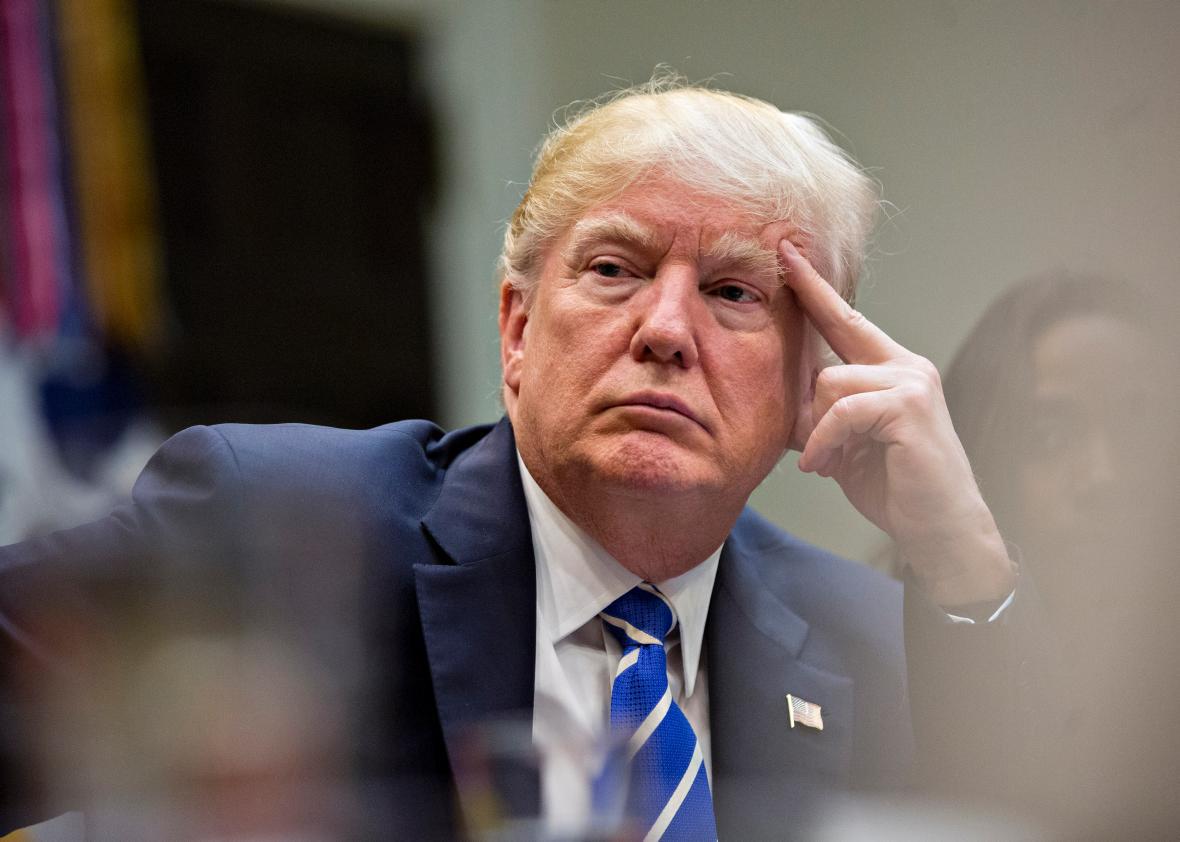Here is a tweet that President Trump tweeted on Sunday:
Again, that is:
Eventually, but at a later date so we can get started early, Mexico will be paying, in some form, for the badly needed border wall.
Marvelous! This means something. But what?
Some say it means that President Trump is on drugs.
Some say it means the White House must have screened Arrival this weekend. Now Trump is trying to think in four dimensions.
I think that Trump is setting the table for his best excuse yet—a grammatical one. The problem is straightforward: English simply lacks a tense to describe the point in time at which Mexico will pay for the wall.
In the “later” part of “eventually,” at a moment before which beginning to construct a wall amounts to an “early” start, Mexico will already “be paying” (in some form). Where is the spot of time—sorry, Wordsworth—that sees Mexico actually pulling out Mexico’s wallet and putting down some pesos? Maybe the consolation here is that, in a certain dimension, existing theoretically and eventually if not visibly and actually, there may already be a wall. Write this down, Spicer: There is already a wall.
Trump may be unconsciously drawing on philosophical precedent. “Lord, let me be chaste, but not yet,” cried Augustine of Hippo in his Confessions. “Mexico, pay for my wall,” commands the president, heir to (or perhaps father of?) Gus’ scholastic hairsplitting. “At some point.”
I am not the first to observe that the POTUS has a trippy relationship to time. (Or maybe I am the first. Maybe I have always already been observing the POTUS’ trippy relationship to time.) In a February speech to Congress, he pledged to begin construction on the border wall “ahead of schedule.” What schedule? As Ben Mathis-Lilley pointed out, “There is no schedule.” There is only Trump deciding when to build the wall. Last week, Sean Spicer waved away a question about why the president had announced that a “powerful armada” was steaming toward North Korea, when it was actually steaming away from North Korea. The aircraft carrier “is headed to the Korean peninsula,” Spicer explained.
“It’s headed there now. It wasn’t headed there last week,” the reporter replied.
“Sure,” agreed Spicer, “but that’s not what we ever said. We said that it was heading there, and it was heading there. It is heading there.”
Welcome to the weirdest verb conjugation class of your life. The ship was heading, the ship is heading, the ship shall forevermore be heading. Spicer meant “eventually,” glossed my colleague Josh Keating. The White House lives in an eternal present. Time is an orange circle.
Trump has come “unstuck in time,” wrote Alexandra Petri back in March, or perhaps in some version of March that is yet to occur. If his statements can be said to be true at a single point on our chronology, past or future, they are perpetually true. The latest (?) tweet about the border wall highlights the difficult grammar of this temporal unfixedness. Eventually, but at a later date, the spirits say that Trump will be building a wall, and Mexico will be paying for it, and America will once and again be great. NASA must hurry to get humans on Mars “at worst, by my second term,” says Trump, for soon the founder of ISIS will be born in Kenya. This is not dementia; it is clairvoyance.
Please refer further questions to the Secretary of State, the Sibyl of Cumae. Also, the Muslim tailgate in Jersey City is going to be lit.
